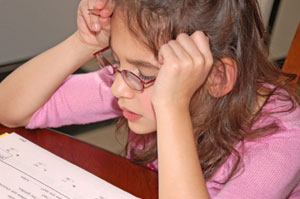 As educators, we are accustomed to seeing our students get anxious on occasion—it’s a normal, healthy reaction to being asked to perform. It gives students that jolt of adrenaline that drives them forward. Some take a breath and work through the feelings, and some need a bit more coaching. Some experience tears, but with a bit of one-on-one help and caring, they can experience great success and learn how to overcome their perceived limits.
As educators, we are accustomed to seeing our students get anxious on occasion—it’s a normal, healthy reaction to being asked to perform. It gives students that jolt of adrenaline that drives them forward. Some take a breath and work through the feelings, and some need a bit more coaching. Some experience tears, but with a bit of one-on-one help and caring, they can experience great success and learn how to overcome their perceived limits.
What about when that anxiety becomes a debilitating impediment to success, such as with true math anxiety? One recent investigation by Beilock, Gunderson, Ramirez, and Levine of the University of Chicago looked into how math anxiety in teachers can affect math achievement in students. (The full study report is available online, but for an easier read, a very nice, accessible write up appeared in the January 2010 Los Angeles Times.)
Their study went something like this: At the beginning of the second-grade school year, teachers were assessed as to their levels of math anxiety, and students were assessed for math achievement. At this time, the data showed no relationship between the teacher’s math anxiety and student math achievement.
By year’s end, study data showed that the more anxious the teachers were about math, the more likely the girls were to have lower scores than the boys upon assessment. Moreover, the girls were more likely to believe the gender-based stereotype that "boys are good at math, and girls are good at reading." The girls who held this belief "had significantly lower math scores than girls who did not and lower than boys overall."
As educators, we all understand implicitly that our opinions and emotions can deeply affect our students. With this study, we now have an even deeper understanding of the functions, as well as a perspective on the social and academic implications of teacher math anxiety.
If you know students or teachers (or anyone, for that matter) who struggles with math anxiety, there are some great resources online to help, such as Math.com (see study tips at http://www.math.com/students/advice/anxiety.html) and Math-and-ReadingHelp.com (see " Ways to Overcome Math Anxiety.")

